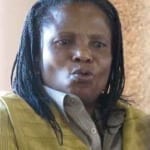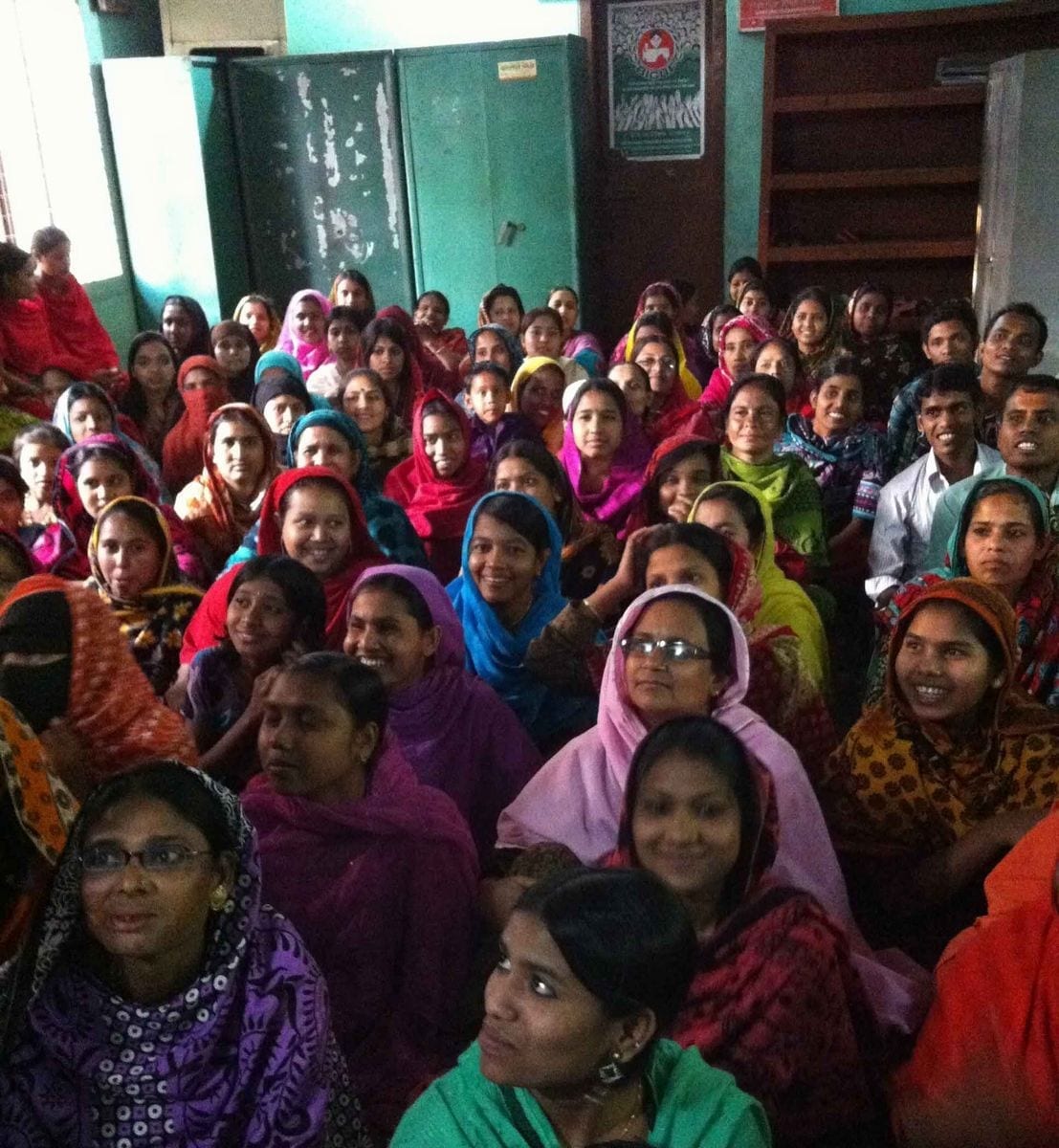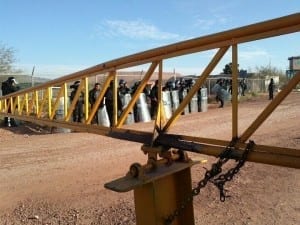Mar 5, 2014

Phumzile Mashishi, HOSPERSA gender project officer, helped lead the gender action learning process in her union.
Each day this week, leading up to International Women’s Day March 8, the Solidarity Center is highlighting an example of how women and their unions are taking action to improve women’s lives on the job, in their unions and in their communities.
Unions around the world are at the forefront of the struggle for gender equality. And sometimes, that means taking a look at their own structures, policies and practices to ensure they, too, are working to make equal treatment and non-discrimination central to their efforts.
In South Africa, four unions grappling with the complexities of gender inequality took part in a structured, multiyear process facilitated by the South Africa Gender Action Learning Program. The group is part of Gender at Work, a global nongovernmental organization that helps organizations become models for a more equitable and accountable world.
The unions—which represent building and construction workers, health care and retail workers and farm workers—recognized that male-dominated, hierarchical, union culture does not easily address issues such as sexual harassment and violence against women within the union, and they sought to develop alternative models of power. The process involves feminist popular education, interactive learning and a lot of work “at the consciousness-raising level,” said Nina Benjamin, who led the project which, for one union, began in 2005. Benjamin is gender research program coordinator for Labour Research Service/Gender at Work, South Africa.
A recent Solidarity Center-sponsored report, “Bringing Back the Heart,” explores the Gender at Work process with these unions and details how the partnerships achieved tangible results:
• Increasing numbers of women joined the unions,
• More women ran for union leadership positions,
• Union leadership gained a deeper understanding of worker concerns and became more accountable in addressing them, and
• Union activists reported that the process reinvigorated and re-inspired them, even in the face of widescale workplace restructuring and deteriorating working conditions.
The process ensured that gender work was not relegated to the status of an “add on.” Leaders developed unionwide strategies for achieving gender equality—and made notable progress.
• The South African Commercial Catering and Allied Workers Union (SACCAWU), which organizes workers in the hospitality, catering, retail, service, tourism and finance sectors, includes a majority of women as members—but few had been union leaders. Following its partnership with Gender at Work, women routinely ran for and were elected into key leadership positions at the worksite level.
• The autonomous, women-led trade union, Sikhula Sonke, reported that membership was growing, domestic violence was decreasing and union leaders were tackling broader discrimination issues (such as xenophobia, homophobia and HIV). The union, which organizes those who live and work on fruit and wine farms, also found farmworkers’ daily lives were improving and they were gaining access to new resources.
• The predominantly male construction union, the Building, Construction and Allied Workers Union (BCAWU) engaged key male leaders in the Gender at Work process, with the result that more women have joined the union, and they now increasingly participate in the union, such as by becoming shop stewards.
• Health and Other Service Personnel Trade Union of South Africa (HOSPERSA), which represents public and private health-care workers, primarily nurses, expanded its reach to grassroots members. Together with union leaders, they are building a new culture of unionism—broadening campaigns from a focus on wages to include issues central to the lives and work of its predominantly female membership.
These four unions demonstrate the challenges of organizational change, but their experiences also show that even in unions with diverse memberships and experiences, a focus on gender equality can empower women and return the balance of power back to members.

Mar 5, 2014
More than 400 Bangladesh garment workers and trade unionists rallied over the weekend at the National Press Club in Dhaka, the capital, to demand police take action to find perpetrators who beat and badly injured a garment worker leader and four union organizers last week. The group was talking with garment workers when they were attacked, and police subsequently refused to accept a report on the incident.
After rallying at the Press Club, union activists and their allies marched to the Ministry of Home Affairs, where staff received a small delegation of activists and accepted their letter calling for government officials to pursue justice for the victims. Later that night, police accepted the crime report from the victims of the violent attack, the prelude to beginning an investigation.
Participants in the rally and march include members and leaders of the Bangladesh Federation of Workers Solidarity (BFWS), where the injured organizers work, the Bangladesh Garments and Industrial Workers Federation (BIGUF), the Sommilito Garments Sromik Federation (SGSF), Bangladesh Garments and Industrial Sramik Federation (BGIWF) and the National Garment Workers Federation (NGWF).
The factory, which had been closed following a workers’ protest against the business not paying the minimum wage on February 18, was fully reopened on March 2. Some 30 workers now say they have been verbally terminated.
Mar 4, 2014
As International Women’s Day approaches, the global labor movement is mobilizing to put teeth into the celebration’s 2014 theme, “Equality for women is progress for all.” Solidarity Center allies around the world also are getting set to highlight the struggles of working women with actions that include rallies by banana workers who are members of the union SITRABI in Guatemala and a conference honoring women workers from Jordan and Palestine. (Follow Women’s Day actions on Twitter with the hashtag #IWD2014.)
Two days after International Women’s Day, commemorated annually on March 8, union activists will take part in the 58th Session of the Commission on the Status of Women. There, they will push for concrete goals to redress income inequality that focus on employment, well being and security in large part by addressing gender inequality in the labor market and in social policies.
The International Trade Union Confederation (ITUC), along with several global union federations, issued a joint statement last week detailing recommendations they will present to the CSW to ensure women’s rights to decent work, quality education and quality public services are at the heart of its post-2015 agenda. CSW’s post-2015 agenda will supplement the “Beijing Declaration and Platform for Action (Beijing+20),” a plan for women’s empowerment that member states approved in 1995.
CSW, part of the United Nations, is a global policy-making body dedicated exclusively to gender equality and advancement of women. Representatives of member states gather at the UN in New York each year to evaluate progress on gender equality, identify challenges, set global standards and formulate concrete policies to promote gender equality andwomen’s empowerment worldwide. This year’s meeting runs from March 10-21.
Ensuring the rights of the billions of informally employed workers, the majority of whom are women, is an essential part of the global unions’ recommendations to CSW. Fundamental rights and protections for informal economy workers, such as street vendors and domestic workers, must include coverage by national labor laws, access to social service benefits and a guaranteed minimum wage.
The global unions’ joint statement points out that the majority of jobs created in the past two decades are short-term, part-time, temporary, casual or informal—categories in which a majority of women are employed, making gender equality an essential part of meaningful solutions to the world’s growing income inequality.
Unions around the world organize and mobilize women, promote women as leaders and decision-makers and aim to achieve fair access to decent work for women. Each day this week, leading up to International Women’s Day March 8, the Solidarity Center will highlight an example of how women and their unions are taking action to improve women’s lives on the job, in their unions and in their communities.
Feb 28, 2014
Government restrictions and repression of citizens’ universal right to freedoms of assembly and association topped the list of violations in the State Department’s 2014 annual “Country Reports on Human Rights Practices.”
The report, released yesterday, also singled out the April collapse of the multistory Rana Plaza building in Bangladesh, which killed more than 1,100 garment workers, as among the worst incidences of human rights violations in 2013.
The congressionally mandated report is not an intellectual exercise, said Secretary of State John Kerry in discussing the findings.
It is “about accountability. It’s about ending impunity. The struggle for rights and dignity couldn’t be more relevant to what we are seeing transpire across the globe.”
Get the overview and the full report.
Read Kerry’s statement.
Feb 28, 2014

Miners at the El Coronel mine in Zacatecas, Mexico, voted to join the union Los Mineros. Photo: Julia Quiñonez
Mineworkers at the El Coronel gold mine in Zacatecas, Mexico, have voted to join the National Union of Mine, Metal, Steel and Similar Workers of the Mexican Republic, known as “Los Mineros” or SNTMMSSRM in Spanish, with 425 workers voting for the union to be its bargaining representative.
A team of international observers from non-governmental organizations and unions monitored the election and reported that the “voting on February 21 was conducted in a substantively fair and transparent manner, free of interference from the employer or government officials.”
Three unions were represented on the ballot, including Los Mineros. As it has done on previous occasions when there is concern of violence or vote-rigging, the Solidarity Center convened an international team of observers to ensure that the voting process was fair. The team served as a visible presence seeking to reduce the risk of any clashes, intimidation, or harassment and to detect any irregularities in the process that could have hindered the successful completion of a free election. Members of the independent observation team are all trained and experienced in international protocols for election observation, such as only interviewing workers after they have voted and not asking workers which union they voted for or other personal information.
The team included representatives of the Solidarity Center, United Steelworkers (USW), Border Committee of Women Workers (Comité Fronterizo de Obrer@s (CFO), the Project on Organizing, Development, Education and Research (PODER) and Project for Economic, Social and Cultural Rights (ProDESC).
More details about the campaign are available from the USW.



